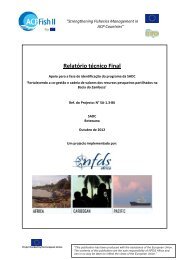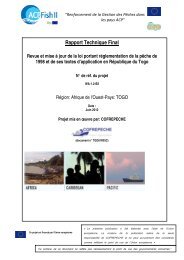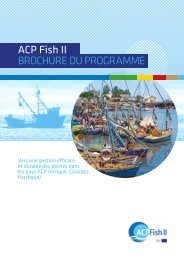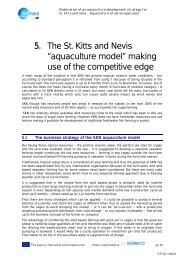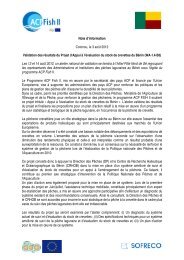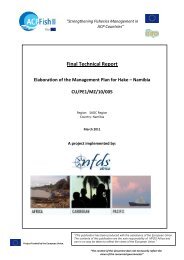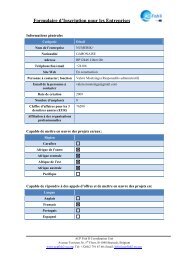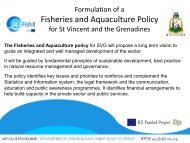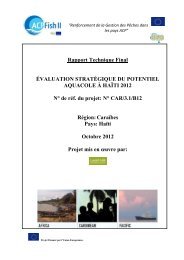Final Technical Report - ACP Fish II
Final Technical Report - ACP Fish II
Final Technical Report - ACP Fish II
You also want an ePaper? Increase the reach of your titles
YUMPU automatically turns print PDFs into web optimized ePapers that Google loves.
Training for <strong>Fish</strong>eries Management Planning in Ethiopia<strong>Final</strong> <strong>Report</strong>1 IntroductionIn 2008, the fish catch in Ethiopia was approximately 17,000 tons. The bulk of which (74%)originated from the six main lakes (Tana, Ziway, Langano, Awassa, Abaya and Chamo) and a further26% from other water bodies. As fish potential is estimated at 45,000–51,500 tons per year,according to several sources, less than 38% of this potential is currently exploited, demonstratingconsiderable room for expansion through proper management. However, the sector suffers from:Environmentally unsustainable and illegal fishing practices (such as small mesh size nets,seeds and plants to intoxicate the fish);Low participation of the fishing communities in fisheries management;Lack of information on most water bodies and their catch and potential, given that nosystematic fish stock assessment has been carried out so far;Limited institutional, technical and financial capacity, especially in the areas of resourcemonitoring, control and surveillance, planning and coordination of activities;Low research and development capacities.In 2009 the Ministry of Agriculture (MoA) expressed to the <strong>ACP</strong> <strong>Fish</strong> <strong>II</strong> programme a desire forsupport to help introduce improved fisheries management and a more co-management styleapproach to the management of the country’s fisheries. This report describes the <strong>ACP</strong> <strong>Fish</strong> <strong>II</strong> Project« Training for <strong>Fish</strong>eries Management Planning in Ethiopia » assignment, which was a response to thatrequest. Working closely with fisheries staff from the Federal Ministry of Agriculture, Oromia Regionand SNNPRS (Southern) Region the consultants (Key Expert 1 and 2) undertook a document review,training needs assessment (TNA), prepared and delivered a 7 day fisheries management planningtraining workshop in Hawasa and then finalised the drafts of two case study fisheries managementplans (FMP) as key outputs from the mission. The terms of reference (ToR) for the assignment aregiven in Annex 1.The mission took place from 15 March to 21 April 2011 and the consultants were contracted byCardno Emerging Markets (UK) Ltd. A detailed itinerary for the 30 day period, including the peoplemet, is presented in Annex 2. The main text of the report presents the context of the mission, themethodology used, a description of the activities carried out and conclusions and recommendations.2 Comments on the ToRsThe objectives and scope of work are clearly defined in the terms of reference and the necessaryrequirement for a more collaborative/co-management approach to fisheries management is clear.Some specific comments are:At the beginning of the mission the MoA requested the consultants develop 2 FMPs: for Lake Chamoand Lake Ziway. The idea of developing two FMPs was not clear from the tors. There was also arequest to increase the number of trainees attending the workshop from 10. The consultantsendeavoured to satisfy the MoA requests by drafting two FMPs and training 13 fishery officers.Key to the development of an effective fisheries management plan (FMP) for the target fisheries isthe availability of relevant data and information on the fisheries, including stock assessment data. Theterms of reference highlight that there is a lack of such information and limited research anddevelopment capacities to rectify this problem in the near future. Efforts have been made during themission to collate as much available information as possible and Key Expert 2 has a significantcollection of information on Ethiopian fisheries that was referred to. Efforts were made during thetraining workshop to include primary data from participants into the FMP development process andP a g e | 3Project funded by the European UnionA project implemented by Cardno Emerging Markets (UK) Ltd



